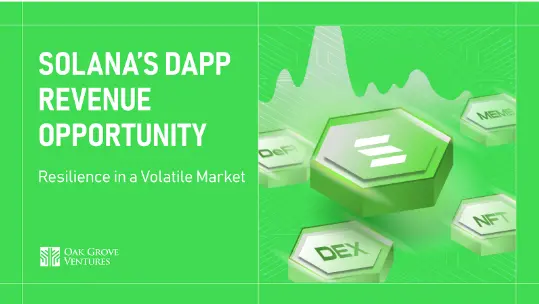Find the core where Solana truly excels over Ethereum
Author: gabrielShapir0 (@lexnode)
Compiled by: Joyce, BlockBeats
I have wanted to write this article for a while, and since I delved into Solana (and its centralized sources at the DApp level) a year ago, I have been pondering these issues.
Generally speaking, it seems to me that Solana attempts to achieve better scalability and composability by shifting costs onto DApp teams and infrastructure providers rather than users… This is also the source of the SOL value flywheel.
If the primary goal of a blockchain is to achieve low fees, then the value of its token cannot solely come from transaction fees. In contrast, Ethereum's value growth comes from users needing to pay (and partially burn) ETH with each transaction, making fees expensive for users but beneficial for ETH holders.
On the other hand, to ensure the security of the blockchain, some form of value proposition is needed. How does Solana address this issue?
Charging state rent to decentralized application (DApp) teams.
Charging voting fees to validators, which are fees that validators must pay to participate in block voting.
These two features do not exist in Ethereum, and they create additional value drivers for the Solana token (SOL), which somewhat offsets the impact of the lack of demand for transaction fees on the SOL price, while also alleviating some security and public resource issues (such as state bloat).
However, the problem is that both may limit decentralization (as the fixed costs of becoming a validator increase), and additionally, the existence of state rent and the difficulty of coordinating payments at the "community" level effectively restricts the immutability of DApps.
The first issue was pointed out by @ceterispar1bus in his article on Solana for Delphi Research, "This fixed cost combined with variable income based on holding mechanisms essentially has a natural centralizing force, as larger validators essentially extract voting fees from smaller validators. The example below is a high-level illustration of this dynamic. After about 10 days of voting, the largest validator increased their initial holding by 0.6%, while smaller validators purely lost 0.6% from voting."

The second issue is that we have already seen at least one Solana DApp team abandon their DApp during the bear market.

Setting aside token economics, another frequently noted issue is the hardware requirements for performance validators on Solana… However, despite fierce criticism from ETH maxis, this is not a "centralization" issue------Solana validators are decentralized (high Satoshi coefficient).
"One of the most common criticisms of Solana is the expensive hardware required to run a full node. Due to the high costs of running a full node, the number of nodes will be limited to a small subset of network participants. Solana's target slot time is 400 milliseconds, and the globally distributed set of validators is slower compared to centralized validators, so how does Solana perform, and how does it achieve such performance?"

There is also the question of how smart contracts work on Solana and the accompanying centralization/trust issues… Solana contracts work on a literal on-chain inheritance structure, for example, all NFTs are subcontracts of the main NFT contract controlled by Metaplex multi-signature.
"My first concern is the number of key programs still controlled by multi-signature. For example, each NFT is based on Metaplex's standard, and before they make their programs immutable in about two years (z years), every NFT on Solana could potentially be changed to, say, a banana, or a coconut, or even a banana-shaped coconut… You get my point. Even with this planning for immutability, Metaplex now introduces a tax, and the concerns about centralization/monopoly still exist."

This inevitably raises obvious trust issues; however, this model may also bring some benefits. It turns the creation of new smart contract standards into an entrepreneurial activity while simultaneously reducing the due diligence burden on users, as they no longer need to check the deployment status of individual token contracts.
On the other hand, this model and the cNFT model also demonstrate how costs can sometimes be hidden. If there are too many rent-seekers, user costs may increase, while Solana structurally provides some opportunities that Ethereum does not. MetaPlex may forever tax NFT transactions.
At the same time, cNFTs are very appealing to users and can provide them with lower costs, thereby reducing overall fees. However, these reduced fees will be passed on to DApp teams to pay for RPC (remote procedure call) costs to maintain data. This means that, similar to the state rent issue, Solana's DApps may fail the "Bahamas test."
In all these aspects, to say that Solana is less "decentralized" than Ethereum would be a huge mistake… This is not a matter of power decentralization… but more precisely, it is an issue of autonomy, which is the issue of censorship resistance.
To understand the distinction, you can read this article on autonomy versus decentralization.
While Ethereum has achieved immutability, autonomy, and censorship resistance at least in theory, and charges users a high premium accordingly, Solana is cheap, shifting security costs onto validators and DApp providers.
Therefore, in general, Solana DApps will find it harder to achieve trust minimization from their teams (affecting autonomy), and theoretically, the economies of scale of Solana's validation should be greater than those of Ethereum validators (decentralization).
Moreover, the reason we care about decentralization is that it limits autonomy. Therefore, the real issue regarding performance requirements is that Solana's validation may be limited, confined to complex data centers that are easily subject to subpoena/seizure, which could lead to the occurrence of censorship.
Thus, if you believe that the USP of blockchain is censorship resistance/autonomy, then ETH is still a better choice than SOL, as it is more suited to the unique purposes of blockchain.
But what if Ethereum is not very good at censorship resistance either? What if Ethereum is not very autonomous?
Ultimately, the pillar of autonomy in a PoS system is the community's willingness to engage in UASF (User Activated Soft Fork) and socially sanction those validators who engage in censorship. Unfortunately, recently, in terms of OFAC (Office of Foreign Assets Control), Ethereum has not shown significant firmness in this regard.
The commercial reality of social sanctions in PoS is that you are not just sanctioning validators, but if those validators are (most likely) institutions, many of their innocent customers using staking services will also be affected.
Will a few Ethereum developers really socially cut millions of dollars of ETH from Coinbase customers because Coinbase "complies with the law" by censoring OFAC's smart contracts? I doubt it, and it seems Vitalik is also skeptical about this (now he advocates privacy pools).











